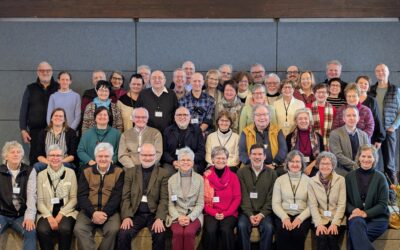 “My sister Maria Assunta was no longer there, swept away by sudden lukemia. I was taken by a sense of powerlessness. ‘What is the sense in living,’ I began to wonder, ‘if death can take away my dreams and achievements?’ Everything lost its meaning. I didn’t want to go on living. Those last moments spent together with Maria Assunta returned to mind. Her strength had abandoned her. Even raising her eyelids was an enormous effort that could have cost her her life. Nevertheless, as we took her home and were removing her from the ambulance on that stretcher, the voices of relatives and friends who had gathered to say their last goodbyes startled her. I saw her face suddenly change. Not only did she open her eyes, but she raised her head and smiled at each one of them. And she didn’t stop smiling until she had greeted each and every one. Then, as soon as the door of the house closed behind us, she allowed her head to fall back on the pillow. . . and went into coma.
“My sister Maria Assunta was no longer there, swept away by sudden lukemia. I was taken by a sense of powerlessness. ‘What is the sense in living,’ I began to wonder, ‘if death can take away my dreams and achievements?’ Everything lost its meaning. I didn’t want to go on living. Those last moments spent together with Maria Assunta returned to mind. Her strength had abandoned her. Even raising her eyelids was an enormous effort that could have cost her her life. Nevertheless, as we took her home and were removing her from the ambulance on that stretcher, the voices of relatives and friends who had gathered to say their last goodbyes startled her. I saw her face suddenly change. Not only did she open her eyes, but she raised her head and smiled at each one of them. And she didn’t stop smiling until she had greeted each and every one. Then, as soon as the door of the house closed behind us, she allowed her head to fall back on the pillow. . . and went into coma.  had she done it? As I reflected on the absurdity of it, I seemed to understand why. The love that spurned her on to be concerned for others and not for herself permitted her somehow to conquer death, and her eyes manifested this. They didn’t show fear of dying, but serenity that reached out to console those around her, as if to say: “Don’t worry. I’m happy.” A thought flashed through my mind: “Antò, you’re the one who’s dead. Assunta is alive!” And so I said: “Enough wasting time! Love is the only direction for my life.” I began with small things, loving the people who were near to me, in simple ways. But over time this little flame began to fade, because loving always was demanding and it didn’t always correspond to my way of doing things. On the contrary, at times I was met with derision. During that period, I had the opportunity to watch a video recording in which Chiara Lubich speaks of the suffering of Jesus on the cross when he cries: “My God, my God, why have you forsaken me?” I felt as if I had been set free. In those few brief moments Chiara undid every knot inside me. Even though she didn’t even know me, there she was explaining life to me. She made me realize that no suffering should be despised, but loved becuase is it all contained in the suffering of Jesus. The word that can best describe the state of my soul when my sister died is “absurd.” It’s absurd to die at twenty! Yet, once I accepted this absurdity I found the sense in living again, and I understood, just as my sister had that you can win out over death. Antonio (Teramo, Italy)
had she done it? As I reflected on the absurdity of it, I seemed to understand why. The love that spurned her on to be concerned for others and not for herself permitted her somehow to conquer death, and her eyes manifested this. They didn’t show fear of dying, but serenity that reached out to console those around her, as if to say: “Don’t worry. I’m happy.” A thought flashed through my mind: “Antò, you’re the one who’s dead. Assunta is alive!” And so I said: “Enough wasting time! Love is the only direction for my life.” I began with small things, loving the people who were near to me, in simple ways. But over time this little flame began to fade, because loving always was demanding and it didn’t always correspond to my way of doing things. On the contrary, at times I was met with derision. During that period, I had the opportunity to watch a video recording in which Chiara Lubich speaks of the suffering of Jesus on the cross when he cries: “My God, my God, why have you forsaken me?” I felt as if I had been set free. In those few brief moments Chiara undid every knot inside me. Even though she didn’t even know me, there she was explaining life to me. She made me realize that no suffering should be despised, but loved becuase is it all contained in the suffering of Jesus. The word that can best describe the state of my soul when my sister died is “absurd.” It’s absurd to die at twenty! Yet, once I accepted this absurdity I found the sense in living again, and I understood, just as my sister had that you can win out over death. Antonio (Teramo, Italy)
Trust in God
Trust in God




0 Comments